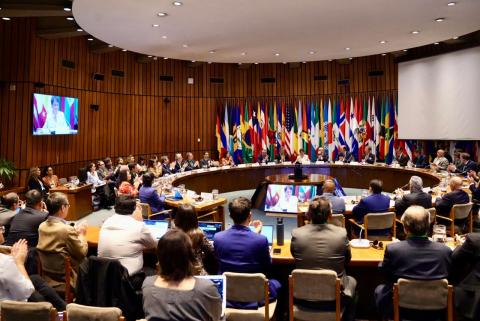News
|
08:30 ─ 09:00 |
Registration |
|
09:00 ─ 09:30 |
Welcome Remarks
|
|
09:30–10:00 |
Review Objectives and expectations of participants from the workshop |
SESSION I - Road Safety Governance: Data Management organized by PAHO |
|
|
10:00–10:30 |
Road Safety Situation Objective: Provide an overview of the status of road safety mortality, motorization, transport policies and infrastructure in the English-speaking Caribbean countries.
|
|
10:30-10:40 |
Questions and comments |
|
|
Coffee Break |
|
11:00- 11:15 |
Road Safety Data Objective: roles and data needs of different sectors; data assessment for effective planning and monitoring, as well as for developing policies and legislations; and Global Voluntary Targets for Road Safety (WHO). Meleckidzedeck KHAYESI, Technical Officer, World Health Organization (WHO) |
|
11:15-11:35 |
Country best practices using data to improve road safety
|
|
11:35-11:55 |
Open discussion |
|
|
LUNCH |
SESSION II – Infrastructure & Management |
|
|
Session A - Infrastructure and Urban Mobility (2.5 hours) |
|
|
13:30-16:00 |
Discussion (30min) |
|
Session B - Road safety management (2.5 hours) organized by ECLAC. |
|
|
16:00 – 18:30 |
Objective: Analyze the regional best practices in the implementation of multi-sectoral partnerships for developing transport plans and road safety strategies aligned for a secure and sustainable mobility.
Discussion |
|
SESSION III - Road Safety Legislation. |
|
|
09:00–11:00 |
Objective: To increase understanding of core UN legal instruments, which could serve as a basis of strong regulatory framework at the national levels, and to identify key next steps for action on the subregional level in accession and implementation. Mr. Robert Nowak, Economics Affairs Officer, UNECE
Facilitated discussion: Identify gaps and opportunities at the sub-regional level (30 min) |
|
|
Coffee Break |
|
11:15 12:45 |
Focus on Vehicle Standards (Including powered two-wheelers) Mr. Romain Hubert, Chief, Road Safety Management and Dangerous Goods Section, UNECE
Facilitated Discussion: Identify opportunities, capacity gap and action plan (facilitated by ECE) (30 min) |
|
|
LUNCH |
|
14:00 14:30 |
Legislations on key risk factors (20 min) Objective: Provide an overview of the regional and Caribbean status of the legislations on speed limits, no use of motorcycle helmet, and no use of seat-belt and child restraint system. Eugênia Rodrigues, Regional Advisor on Road Safety, Pan American Health Organization (PAHO/WHO) |
|
Questions and comments (10 min) |
|
|
4:30 – 14:45 |
How to improve the enforcement (15 min) Objective: Global Road Safety Partnership – enforcement training |
|
|
14:45 – 15:05 |
Countries experiences (20 min)
|
|
|
Questions and comments (10 min) |
|
|
|
|
Coffee Break |
|
WORKSHOP CONCLUSIONS & CLOSING (2 hours). |
||
|
15:20 16:20 |
Summary of Deliberations (ECLAC, IDB, PAHO) |
|
|
16:20 18:00 |
Closing Remarks
|
|


